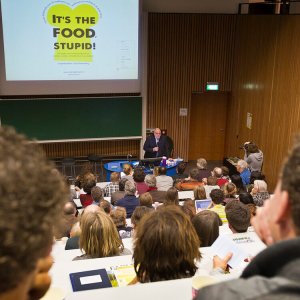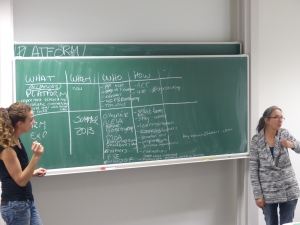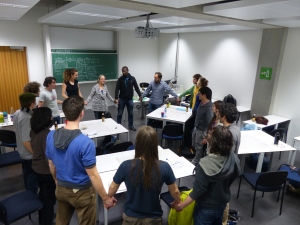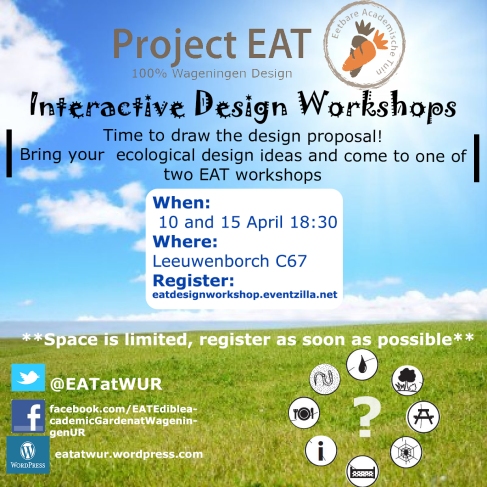The Netherlands needs an agroecology movement; this was made glaringly apparent during the three evenings of agreocolgy at Wageningen University this past week. A movement, practice and science, agroecology is a unique, thought-provoking interdisciplinary approach to agriculture.
Agroecology is an integral component of Project EAT and the garden will be a visual representation and definition of agroecological practices for students and visitors to the Wageningen University campus.
Definitions are varied across the board, making it a rather fun task to give a ‘quick’ definition. In short, agroecology is a multi-functional approach to agriculture; taking into account environmental, social, economic and political concerns on the path to creating a sustainable food system.
All of that was covered in a total of 6 hours over those 3 days. . .

That would be some major Dutch efficiency, yet that was not the goal of the series of meetings. The goal was to make light of where agroecology was in Brazil, the Netherlands, Wageningen, and at Wageningen University. Using the knowledge gathered in the first meetings, we were to take action to make agroecology work.
Irene Cardoso of UFV in Brazil began the series at the “It’s the Food, Stupid” event, detailing the agroecology movement in Brazil. She spoke of the growing concern of “How do we feed the world?” Clearly, she explained, that may be the wrong question to ask.
Isn’t it better if each country feeds itself? Why should the Netherlands feed the world? Such a small country!
Next to the platform was Tom Saat of City Farm Almere. Saat runs an organic farm with 120 hectares of arable land next to the city of Almere.
He spoke passionately about the farm and its rise since 1996, along with the community efforts they have focused on. The farm practices a multitude of agroecological practices: from a grand crop rotation to allowing the cattle to forage in the woods during the Dutch ‘summer’ months.
Day two brought a number of individuals to speak about their agrecological initatives, local and international.
International initiatives:
- Suprabha Seshan shared insight into the united force of students, farmers, and scientists acting to preserve India’s biodiversity
- Irene Cardoso detailed the agroecology movement in Brazil. Oddly enough, this movement also involved cooperation between farmers, NGOs, and universities around Brazil. Western countries take note, cooperation and networking seems to be working.
- Heitor Teixeira spoke of his university, the Federal University of Vicosa, and the student-run initiatives on campus. Vertical gardens and soil-painted buildings are but a few of the many awesome agroecology projects that are going on in Vicosa
Wageningen initiatives:
- New green party intiative for the Wageningen student councilspurred by the Wageningen Environmental Platform (WEP); currently only 1 party exists
- Yours truly, project EAT
- Transition Town Permatuin
- Interdisciplinary Farm Experience; an internship program to connect Wageningen University students to area farmers
- Seed Swap Wageningen; a seed swap occurred on March 1st and another is to follow in April (look for details on the WEP website)!
 These presentations were meant to bring awareness to the people attending the meeting; in turn, lending them some inspiration for the workshop scheduled for the next day. The workshop brought together 20+ people to decide what actions we were to enact in order to develop an agroecology movement in the Netherlands. Through the World Cafe Method; we quickly decided on two ideas to take action on:
These presentations were meant to bring awareness to the people attending the meeting; in turn, lending them some inspiration for the workshop scheduled for the next day. The workshop brought together 20+ people to decide what actions we were to enact in order to develop an agroecology movement in the Netherlands. Through the World Cafe Method; we quickly decided on two ideas to take action on:
A platform for agroecology would involve the people in the room facilitating connections between agroecological movements around the Netherlands, now! We would do so by connecting it to the Farm Experience, Stichting Boerengroep, volunteers, and editing the Wikipedia page (of which I am excited to take responsibility for). ACT groups and a social media presence through using #agroecology would bring further solidity to the platform, among other forms of networking.
Interdisciplinary Farm Experience is to begin in the summer of 2013 and will involve a number of groups from around Wageningen and the Netherlands. We brought together ideas to further the new project: selecting and asking particular farms, connecting with the farmers, determining the length of stay, and developing relationships with organizations looking to get involved.
Agroecology is necessary. It is not an option, we must form alliances around agroecology and further develop the movement across the world. Now, contact one of the initiatives listed and linked above and get started.

This post was written by Tom Boyden. Tom is an exchange student from the University of Wisconsin-Madison currently doing communications work for EAT and running a blog with the goal of creating a new, sustainable food system, OrganicAndUrban.





